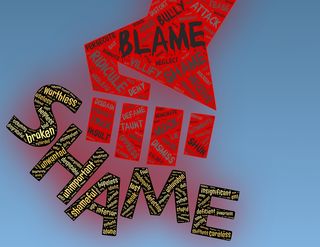Narcissism
Why Does Your Narcissistic Partner Always Blame You?
Learn why your narcissistic mate blames you unfairly and how to handle it.
Posted February 17, 2019 Reviewed by Kaja Perina

If you are wondering why your narcissistic mate blames you for everything that goes wrong no matter who is at fault, the answer is simple: People who have narcissistic personality disorder cannot tolerate the idea that they might be to blame, so they accuse someone else instead.
Why do people with narcissistic personality disorder care so much about who is to blame?
Here are some concepts that can help explain why blame plays such a big role in relationships with Narcissists. (Note: I am using the terms “narcissist” and “narcissistic" as shorthand for Narcissistic Personality Disorder).
Our Inner Guiding Voice
As humans, we come equipped with the capacity to develop an internal guiding voice that praises and punishes our behaviors. This inner voice is programmed during our childhood based on a combination of three things:
- How our parents treated us.
- Our inborn temperament.
- Our interpretation of what our parents thought worthy of praise or criticism.
Ideally, this inner voice is realistic and rewards us with praise when we do the right thing and punishes us with shame or guilt when we do something wrong. And ideally the rewards and punishments are proportionate to the behavior. Our inner guiding voice is supposed to substitute for our parents’ guidance and thus allow us to live independently.
Sigmund Freud (1856–1939), the “Father of Psychoanalysis,” called this voice our Super-Ego. Some people think of it as their conscience. Other people see it as the spark of the Divine in each of us that teaches us right from wrong.
The Narcissist’s Inner Voice
Unfortunately, people with narcissistic personality disorder have internalized an overly harsh, perfectionistic, and devaluing internal voice. This voice rarely doles out praise. Nothing is ever quite good enough to win its approval for very long—and no mistake is too trivial to punish severely.
Self-Blame Leads to Shame
Because narcissists’ inner guiding voice is so critical and harsh, narcissists try to avoid all responsibility for anything that goes wrong. In order to avoid self-hatred, they project the blame onto someone else. If they do not successfully shift the blame, then they may find themselves drowning in a pit of self-loathing and shame. This usually leads them to spiral down into a shame-based self-hating depression. In addition, they unconsciously fear that their mistakes will be used by you or other people to publicly humiliate them.
Once narcissists sink into a self-hating depression, they lose touch with anything good about themselves. They see themselves as all-bad—as worthless, defective, losers.
Naturally, with deep shame always lurking around the edges of their psyche and an inner critical voice that unfairly and severely punishes them, narcissists learn early in life to never take the blame for their mistakes. Instead, when anything is amiss, they quickly blame someone else. If you are their lover or mate, you are the one that is likely to be blamed—no matter how farfetched this seems.
How should you handle the situation?
The unfortunate reality is that this situation cannot be solved by logic or by arguing about who is right or wrong. This type of blaming has nothing to do with external reality or fairness. It is about self-esteem maintenance. Your mate is unfairly blaming you for something in order to avoid self-blame. When narcissists think of accepting blame, they unconsciously fear that the psychological equivalent of burning hot coals will be heaped on their head by you and their unforgiving and unempathic inner critic. They project their inner critic’s opinions onto you and then see you as overly critical.
There are a couple of things that can work in the moment to lessen the tension. Both methods ignore who is to blame and focus on making your narcissistic mate more comfortable.
Method 1—Express Empathy
Method 1 is adapted from one of James F. Masterson’s interventions that he trained therapists to use to help people with NPD feel understood. In this method, blame is not spoken of at all. Neither is right or wrong. You simply make an empathic statement that attempts to capture the flavor of the emotion the narcissistic person is feeling.
Example: Sam comes home and cannot find the remote for the television. He starts screaming at his wife Jennie: I can’t believe that you did it again! Why do you keep losing the remote? You never pay enough attention to what you are doing!
Jennie knows that Sam was the last one to use the remote. She also knows that it is fruitless to argue with him about it. If she protests, it will just lead to a long pointless fight. So, she empathically tries to “mirror” back to Sam what she thinks he is feeling:
Jennie: That must have been so painful to you when you came home and couldn’t find the remote for the TV. I can understand how disappointed you were. You were looking forward to watching the football game.
Masterson tended to use those same words, “painful” and “disappointed” over and over again. Someone once asked Masterson, “Don’t your clients notice and comment on you saying, 'It must be so painful and disappointing' over and over again?” Masterson replied: “Not if they’re Narcissists.”
Narcissists find empathy and feeling understood, coupled with the absence of judgement, very soothing. Most grew up without ever experiencing empathy from their caregivers. That is why their inner voice is so unempathic.
Method 2—Let Me Help You
In this method, you also ignore your mate’s unfair criticisms of you. Instead, you simply offer to help. This method emphasizes that the two of you are a team and not opponents.
Example: Sam starts blaming Jennie for losing the remote. Jenny quickly says: “Let me help you find it.” She ignores his insults and simply gets up and matter-of-factly begins to search with him for the lost remote.
Over time, if Jennie is consistently willing to help Sam and not shame him or try to hold him accountable, Sam is likely to slowly begin to internalize a new model of how to handle mistakes without blaming anyone.
This will gradually build up some sense of trust in Jenny’s good will and intentions. Sam may still devalue and blame Jennie (he still has a Narcissistic Personality Disorder), but he will eventually understand that Jennie is not purposely trying to annoy or frustrate him.
This realization, that he can feel hurt and frustrated by Jenny without her intending to harm him can be a big milestone and turning point in their relationship. The fights will still happen, but there will be less venom in his attacks on Jennie.
What Happened When You Spilled the Milk?
If you want to understand more about the origins of someone’s blaming behavior, there is a simple question you can ask: When you were little and spilled your glass of milk at the table, what happened?
The people I know who are relatively relaxed and realistic about their mistakes, report something like the following: My mother got up and said: “Don’t worry. Get the paper towels from the kitchen and I will help you clean it up.
My clients with Narcissistic Personality Disorder report a very different response: How could you be so clumsy! You make all this extra work for me because you are so careless and irresponsible. That’s it! Dinner is over for you. Go to your room. And don’t expect to watch any television tonight either. You need to learn to be more careful.
A childhood full of harsh criticism for mistakes teaches children to find a way to shift the blame in any way possible and make the error someone else’s fault.
To younger sister Sally: If you hadn’t jogged my elbow, the milk wouldn’t have spilled. It is your fault, not mine. You are the one who deserves to be punished, not me!
Punchline: The reason your narcissistic mate automatically blames you for things that are not your fault can be expressed as a simple equation: Blame + Shame = Self-Hatred. Your mate shifts the blame onto you to avoid being condemned as worthless garbage by his or her own overly harsh and devaluing inner voice. There are things you can do to minimize fights, but unfortunately, they all focus on making your mate more comfortable. This will benefit you in the long run, but their success depends on you literally ignoring your mate’s taunts and your own hurt feelings. Instead you have to act as a combination of a good parent and a psychotherapist. If you do not want to spend the rest of your life helping to manage your mate's self-esteem at your own expense, you should probably seriously consider leaving this relationship.
Adapted from a Quora post.
Facebook image: fizkes/Shutterstock




